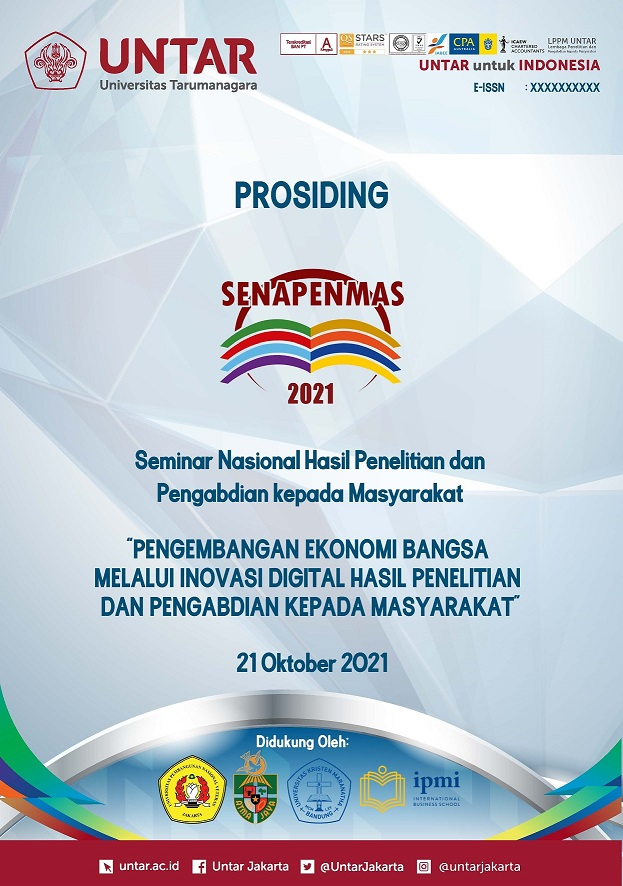BAKAT, MOTIVASI, HAMBATAN DAN HARAPAN MAHASISWA MENJADI ENTREPRENEUR
Main Article Content
Abstract
The high growth of entrepreneurs is one way to deal with globalization, so the government is very serious in developing entrepreneurship programs, especially among students. But being an entrepreneur is not easy, due to several factors such as talent, motivation, obstacles and expectations. The purpose of this study was to determine the talents, motivations, barriers and expectations of students to become an entrepreneur. The respondents of this study were civil engineering students from the 2014-2021 class, totaling 275 students consisting of 180 men and 95 women. Then respondents were asked to answer a questionnaire consisting of 5 main questions related to entrepreneurial knowledge and future expectations. The results showed that the entrepreneurial talent among male students was higher with a percentage of 65.3% while female students were 56.8%. Making a lot of money is the main motivation to become an entrepreneur, while the lack of capital as much as 55.8% is the main obstacle. The choice of business field to become an entrepreneur is not in accordance with the education taken by 53.6%. Short-term expectations are not appropriate by 54.5%, while long-term expectations are in accordance with the percentage of 55.7%.
Pertumbuhnya entrepreneur yang tinggi merupakan salah satu cara untuk menghadapi Globalisasi, sehingga pemerintah sangat serius dalam mengembangkan program entrepreneurship khususnya dikalangan mahasiswa. Namun menjadi seorang entrepreneur tidaklah mudah, karena beberapa faktor seperti bakat , motivasi, hambatan dan harapan. Tujuan dari penelitian ini adalah untuk mengetahui bakat, motivasi, hambatan dan harapan mahasiswa untuk menjadi seorang entrepreneur. Responden penelitian ini adalah mahasiswa teknik sipil angkatan 2014-2021 yang berjumlah 275 mahasiswa terdiri dari 180 pria dan 95 wanita. Kemudian responden diminta untuk menjawab kuesioner yang terdiri dari 5 pertanyaan utama terkait pengetahuan entrepreneur dan harapan masa depan. Hasil penelitian menunjukkan bahwa bakat entrepreneur di kalangan mahasiswa pria lebih tinggi dengan persentase 65,3% sedangkan mahasiswi wanita sebesar 56,8%. Menghasilkan banyak uang merupakan motivasi utama menjadi entrepreneur, sedangkan tidak ada modal sesesar 55,8% merupakan hambatan utama. Pilihan bidang usaha menjadi entrepreneur tidak sesuai dengan pendidikan yang ditempuh sebesar 53,6%. Harapan jangka pendek tidak sesuai sebesar 54,5% , sedangkan jangka panjang sesuai dengan persentase sebesar 55,7%.
Article Details
References
Clleland, D.M. (2011). Characteristics of Successful Entrepreneurs. The Journal of Creative Behavior. Volume 21 pp 219-233.
Brück, T., Naudé, W. & Verwimp, P. (2011). Small business, entrepreneurship and violent conflict in developing countries. Journal of Small Business and Entrepreneurship, 24(2) 161-78
Arafeh B., (2016). An entrepreneurial key competencies’ model 2, Journal of Innovation and Entrepreneurship 5:26
Temidayo Gabriel Apata (2015). Entrepreneurship Processes and Small Farms Achievements: Empirical Analysis of Linkage. Journal of Entrepreneurship Management and Innovation (JEMI), Volume 11, Issue 2, pp: 105-127
Ahlem Omri dan Younes Boujelbene (2015), Entrepreneurial Team: How Human and Social Capital Influence Entrepreneurial Opportunity Identification and Mobilization of External Resources, Journal of Entrepreneurship Management and Innovation (JEMI), Volume 11, Issue 3, : 25-42
David E.Rye (1996 ). Tool for Executives Wirausahwan The vest Pocket Entrepreneur penerbit PT. Prenhallindo .
Eva Kašperová, John Kitching, Robert Blackburn (2018). Identity as a causal power: Contextualizing entrepreneurs’ concerns . The International Journal of Entrepreneurship and Innovation.
Anne-Flore Adam, Alain Fayolle (2016). Can implementation intention help to bridge the intention–behaviour gap in the entrepreneurial process? An experimental approach Th International Journal of Entrepreneurship and Innovation
Muhammad Shehryar Shahid Colin C Williams, Alvaro Martinez ( 2020). Beyond the formal/informal enterprise dualism: Explaining the level of (in)formality of entrepreneurs The International Journal of Entrepreneurship and Innovation Identity as a causal power Contextualizing entrepreneurs’ concerns
Thea van der Westhuizen, Marialauda Joel Goyayi. (2021) The influence of technology on entrepreneurial self-efficacy development for online business start-up in developing nations The International Journal of Entrepreneurship and Innovation
Petra Biberhofer, Claudia Lintner, Johanna Bernhardt 2018. Facilitating work performance of sustainability-driven entrepreneurs through higher education: The relevance of competencies, values, worldviews and opportunities. The International Journal of Entrepreneurship and Innovation


